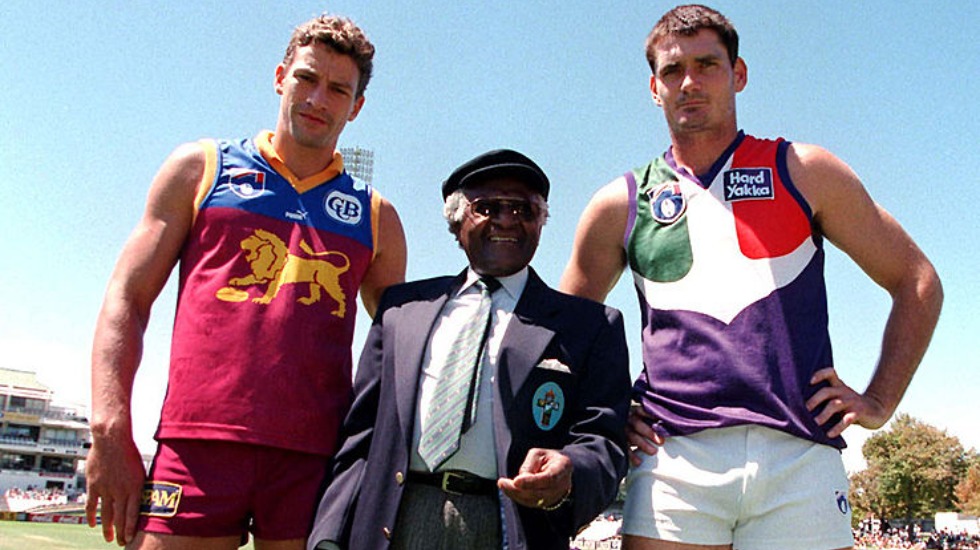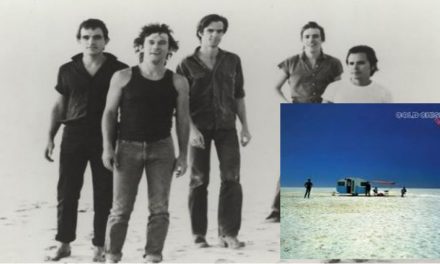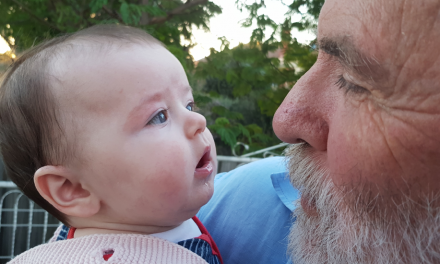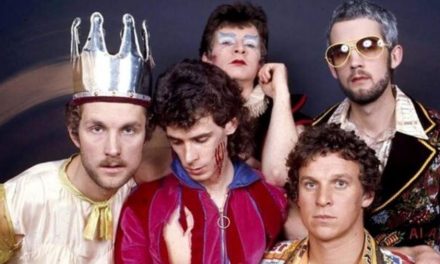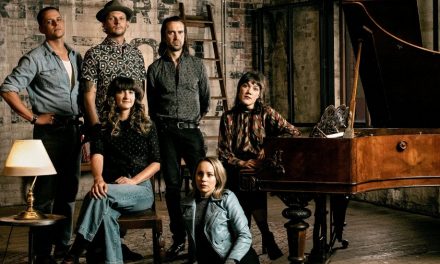Archbishop Desmond Tutu with Brisbane’s Matthew Clarke and Fremantle’s Peter Mann before a pre-season game in South Africa in 1998. Photo: TONY FEDER/ALLSPORT
In the early 2000s, when the AFL was actively seeking to promote Australian football in South Africa, the AFL Indigenous youth team (called the Boomerangs) visited that country. Michael Long was with them, I was writing a book on Michael Long.
In “The Short Long Book” (Vintage, 2015), I wrote: “In one day, the Boomerangs went to Nelson Mandela’s home in Soweto, to a museum built for victims of the Sharpeville massacre, and to the Regina Mundi church which still has bullet holes in its walls and an altar whose corner was shattered by a rifle butt and a communion rail broken in the same way. The young men were told the story. During the Apartheid regime, being denied the right to gather politically, people came each Sunday to the church in their thousands. One particular day, Anglican Bishop Desmond Tutu had been invited to preach. Having failed to frighten the congregation out of the church by firing bullets into the roof, soldiers stormed the church and tried to strong-arm Tutu from the pulpit, but he clung on and continued preaching about a God of love. A few days later, the young Indigenous men from Australia met Bishop Desmond Tutu in his Cape Town cathedral.
“Michael Long made a speech. I don’t remember the words, but his tone was exactly right. He did what he had told the young men in the team to do when they arrived in South Africa – he was humble and respectful, both to the bishop and his cathedral. Then he presented Tutu with a footy. Receiving the ball with a mischievous grin, the bishop went for a bounce, the ball leapt sideways into a pew and the young blokes were immediately taken with his sense of fun, this man who could not be intimidated with rifles”.
PLEASE HELP US CONTINUE TO THRIVE BY BECOMING AN OFFICIAL FOOTYOLOGY PATRON. JUST CLICK THIS LINK.
Afterwards, we were in a café. I was sitting beside Colin Carter, later president of Geelong. I’d been to a Cape Town church the previous day with Colin and his wife Angie. The congregation was black and we were white. Colin was invited to the pulpit to speak and did. So there we were, sitting in this café and a few tables away was Desmond Tutu, surrounded by about a dozen whites, parishioners perhaps. There was lots of chatter and several times I heard his raucous cackling laugh. I said to Colin, “There’s a question I’ve always wanted to ask him”. Colin said, “What?”, and I told him. He said, “Ask it”.
And so when Desmond Tutu got up to leave I hurried across and reached him just as he got to the café door. “Bishop,” I said. He stopped and I saw an immense weariness in him. How many times would he have been stopped, I suddenly thought, for help and guidance. Had I known I would not have bothered him, but the moment had arrived with the script written. “Bishop Tutu,” I said, “I keep hearing you laugh and yet I know you’ve seen terrible things”. I had seen footage of Tutu trying to stop a black person being “necklaced” – having a rubber tyre filled with petrol placed around their necks and set alight – for being a suspected police informer. I asked my question: “Does God laugh?”
He took my forearm in his hands in a most solemn way and said, “Yes, God laughs. And God cries”, and I saw another Desmond Tutu to the one I’d seen on TV, one with a black hole in him like a deep mineshaft of grief at the human awfulness he had witnessed. This man who laughed and delighted in life had been to despair and come back many times to delight and invigorate others. Some people have much bigger lives than the rest of us. His was one of the big ones I met. Big as a mountain.

